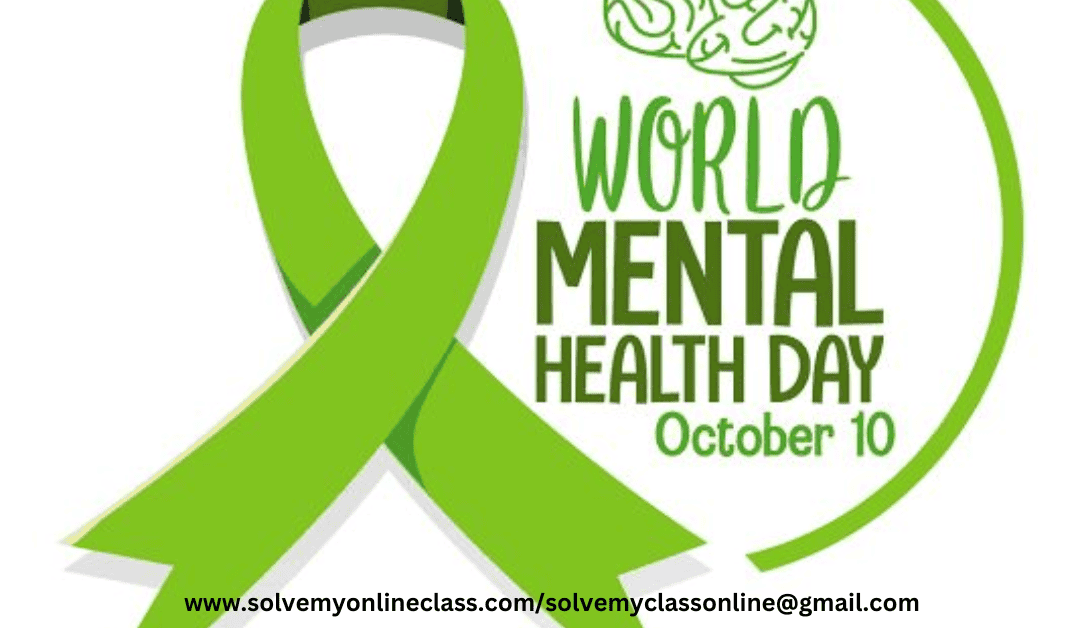Introduction
Every year on October 10th, the world celebrates World Mental Health Day as a means of bringing attention to mental health issues, campaigning for mental health services, and advancing general mental wellness. This day, which was created by the World Health Organization (WHO), serves as a reminder of how crucial it is to address mental health issues and lessen the stigma attached to them. We’ll discuss the significance of World Mental Health Day, the present situation of global mental health, and ways that we can all work together to improve mental health in this blog.
Knowledge of the World Mental Health Crisis:
Millions of people have mental health illnesses globally, making it a critical concern. As a result of the COVID-19 epidemic, people and communities all across the world have reported feeling more stressed, anxious, and depressed. According to the WHO, depression is the primary cause of disability worldwide, and 800,000 people die by suicide each year. Despite these startling statistics, the mental health industry continues to be underfunded and underserved in many nations.
The stigma associated with mental illness:
The widespread stigma that still surrounds mental health concerns is one of the biggest barriers to treatment. People who have mental health issues frequently experience prejudice, discrimination, and social isolation. This stigma may discourage people from getting assistance and may prolong the cycle of suffering in silence. By promoting open dialogue about mental health and highlighting the fact that mental health concerns are just as real and deserving of care as physical health problems, World Mental Health Day aims to combat this stigma.
fostering mental health:
Every year, a new facet of mental health is addressed by the World Mental Health Day theme. The promotion of mental health, however, runs through all of these themes. Here are some essential tactics to support mental health:
- Increase Awareness: The first line of defense against stigma is education. Hosting conferences, workshops, and other events can help distribute information about the services and treatments that are available and promote awareness of mental health issues.
2. Destigmatize Mental Health: Having open and sincere conversations about mental health can assist in removing obstacles and lowering stigma. Encourage discussion of mental health in your neighborhood and place of employment.
3. Improved access to mental health care services should be promoted. Governments and healthcare systems should make investments in the infrastructure for mental health, making it more widely available and inexpensive.
4. Employers have a significant impact on the promotion of mental health among their staff members. Offering mental health tools, allowing for flexibility in working hours, and fostering a positive workplace culture can all significantly improve productivity.
5. Self-Care: Encourage people to practice self-care. Promote practices that improve mental health, such as exercise, mindfulness, and stress reduction.
6. Encourage the formation of support networks among friends, families, and local communities. For those struggling with mental health issues, a robust support network can be a lifeline.
7. Encourage those who are having mental health problems to seek the assistance of mental health specialists. Different mental health issues can be effectively treated with both therapy and medicines.
2023’s World Mental Health Day: The Way Ahead:
The following year’s World Mental Health Day will have the topic “Mental Health Care for All: Let’s Make It a Reality.” This subject underlines how critical it is to guarantee that everyone, regardless of socioeconomic level, has access to high-quality mental health care. Several steps can be made in order to make this a reality:
Advocate for legislation and policies that prioritize mental health services as a crucial component of comprehensive healthcare. Governments should adopt policies and allocate enough resources to address gaps in access to mental health treatments.
- Support for the Community: Establish and promote community-based mental health services that deliver care and assistance locally. Peer support networks, crisis hotlines, and local government To guarantee that future generations are knowledgeable about mental health concerns and can help to lessen stigma, include mental health education in school curricula.
- Encourage the use of telemedicine services for mental health treatment, particularly in areas with poor access to in-person care. Telehealth can fill the gap and increase access to mental health services.
- Encourage firms to develop workplace programs that promote mental health. This involves offering employee assistance programs (EAPs), mental health days, and fostering a supportive and understanding culture.
Conclusion:
The importance of reminding everyone that mental health is a universal concern on World Mental Health Day. We can improve the lives of millions of people worldwide by putting mental health first, eradicating stigma, and fighting for better access to mental health care. Take this chance to pledge to a world where everyone has access to mental health care and where no one needs to suffer in silence. Keep in mind that mental health matters, and it’s time to ensure that everyone has access to it.






